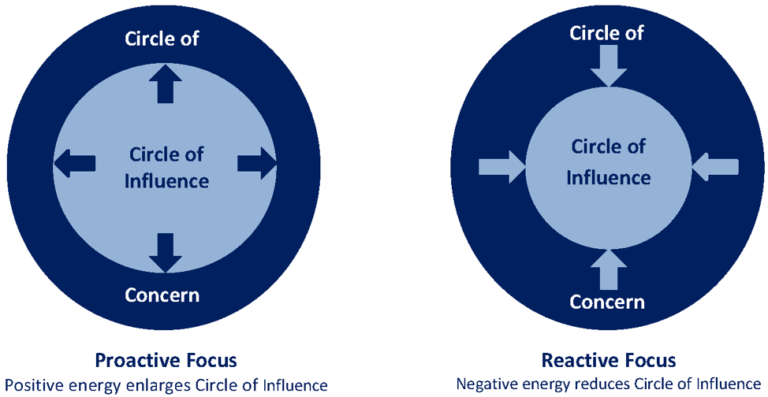In his international bestselling book “Seven Habits of Highly Effective People”, author Stephen R. Covey observed that proactive people focus their effort on their circle of influence instead of paying attention to their circle of concern. He further distinguishes between the circle of influence and the circle of concern:
“Another excellent way to become more self-aware regarding our own degree of proactivity is to look at where we focus our time and energy. We each have a wide range of concerns — our health, our children, problems at work, the national debt, nuclear war. We could separate those from things in which we have no particular mental or emotional involvement by creating a “Circle of Concern.
As we look at those things within our Circle of Concern, it becomes apparent that there are some things over which we have no real control and others that we can do something about. We could identify those concerns in the latter group by circumscribing them within a smaller Circle of Influence. By determining which of these two circles is the focus of most of our time and energy, we can discover much about the degree of our proactivity.
Proactive people focus their efforts in the Circle of Influence. They work on the things they can do something about. The nature of their energy is positive, enlarging and magnifying, causing their Circle of Influence to increase.
Reactive people, on the other hand, focus their efforts in the Circle of Concern. They
focus on the weakness of other people, the problems in the environment, and circumstances over which they have no control. Their focus results in blaming and accusing attitudes, reactive language, and increased feelings of victimization. The negative energy generated by that focus, combined with neglect in areas they could do something about, causes their Circle of Influence to shrink.
Meditations
Daily Calm with Tamara Levitt. – Holding Space
When witnessing someone suffer, it is natural to want to help. There are times when offering advice or solutions is helpful, but other times, the most supportive thing we can do when someone is struggling is to hold space for them. Holding space means just being there, offering a hand to hold or a shoulder to lean on. It means being present and allowing what is happening to happen without trying to repair or solve it. It may not feel constructive, but often, it’s the most helpful thing we can do.
Our nonjudgmental presence allows others to safely explore their emotions and trust their intuitive wisdom. By creating a compassionate space, we empower our friends and loved ones to voyage down their own path of healing and resolution at their own pace.
Just letting someone speak their truth can sometimes be the biggest gift you can give them, to just hold the space for them. – Amanda Palmer
Daily Jay with Jay Shetty – Love-Life Balance
It is about how our romantic life fits into the rest of the picture. It is about weighing how much energy you put into your various types of relationships so that you can be your best self across the board. A healthy love life, like a healthy work life, needs boundaries. Be intentional about how you are spending your time and energy. Sometimes, the answer is to love smarter, not harder.
Daily Trip with Jeff Warren – Do I have to Focus on my Breath?
Meditation is the art of existing right here in the moment. We let everything just happen all around us and inside us.
Podcast
- The Healing Poet: “Vulnerability Is Scary As F*** But So Worth It” – You Can Heal Through Creativity
All the best in your quest to get better. Don’t Settle: Live with Passion.

Comments are closed.